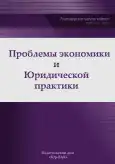Institutional conditions for digital integration in Russian industry
- Authors: Obolenskaya L.V.1, Bekulova S.R.1, Abdikeev N.M.1
-
Affiliations:
- Financial University under the Government of the Russian Federation
- Issue: Vol 19, No 4 (2023)
- Pages: 141-148
- Section: Regional and Sectoral Economics
- URL: https://journal-vniispk.ru/2541-8025/article/view/145611
- DOI: https://doi.org/10.33693/2541-8025-2023-19-4-141-148
- EDN: https://elibrary.ru/FNJNZV
- ID: 145611
Cite item
Abstract
The subject of research in the article is the institutional conditions for digital integration in the Russian industry. By «institutional conditions», the authors mean the legal and regulatory conditions or environment for digital integration. The goal is to develop the classification of digital integration documents in the Russian industry for their presentation in a structural format convenient for analytical work. It is proposed to include among the features of the classification: the functional purpose of the document, the degree of its focus on the industry and the degree of its focus on the digital sphere. On the basis of the proposed classification features, the authors structured an array of legal documents of digital integration in the Russian industry. The resulting structural design includes three blocks of documents, identified on the basis of «functional purpose of the document». The first block covers the key documents that form the institutional and target aspects of digital integration in the Russian industry. The second block consists of key documents that form the institutional conditions for digital integration in the Russian industry in the field of planning, programming and forecasting. The third block included key documents that establish legislative norms, rules and standards related to digital integration in the Russian industry. Within each block, the documents are structured according to their degree of industry and digital focus. It is concluded that the use of the proposed classification features makes it possible to streamline and systematize a vast array of digital integration documents in the Russian industry, presenting it in the form of a visual structural-tabular structure, convenient for analytical work. The study is based on methods of classification and structural analysis, as well as generalization and interpretation of scientific and regulatory information.
Full Text
##article.viewOnOriginalSite##About the authors
Lyudmila V. Obolenskaya
Financial University under the Government of the Russian Federation
Author for correspondence.
Email: obolenskayalv@gmail.com
ORCID iD: 0000-0002-1016-9171
SPIN-code: 7461-0270
Scopus Author ID: 57204951512
Cand. Sci. (Eng.), Leader research associate, Institute for Financial and Industrial Policy
Russian Federation, MoscowSusanna R. Bekulova
Financial University under the Government of the Russian Federation
Email: SRBekulova@fa.ru
ORCID iD: 0000-0003-1384-4694
SPIN-code: 8772-6960
Junior Researcher at the Institute of Financial and Industrial Policy
Russian Federation, MoscowNiyaz M. Abdikeev
Financial University under the Government of the Russian Federation
Email: NAbdikeev@fa.ru
ORCID iD: 0000-0002-5999-0542
SPIN-code: 6395-7663
Scopus Author ID: 36625026600
Dr. Sci. (Eng.), Professor, Director of the Institute of Financial and Industrial Policy
Russian Federation, MoscowReferences
- Anokhina L.V. Perspective Directions for the Formation of the Regulatory Environment of the Russian Digital Economy // Economics and Business: Theory and Practice. 2019. No. 2 pp. 5–7. (rus). doi: 10.24411/2411-0450-2019-10355.
- Babkin A.V., Burkaltseva D.D., Vorobey D.G., Kosten Yu.N. Formation of digital economy in Russia: essence, features, technical normalization, development problems. St. Petersburg State Polytechnical University Journal. Economics, 2017, no. 10 (3), pp. 9–25. (rus). doi: 10.18721/JE.10301.
- Boyakova K. N. The policy of regulating the digital transformation of industry in Russia // Business. Society. Power. 2022. No. 44–45. pp. 126–140. (rus). URL: https://e-cis.info/upload/iblock/4ea/vzo9fgbk5f2aj2x8i5kpljw9vejhto57.pdf (accessed 03/25/2023).
- Govorun N.N., Zalatoryus Yu.P. and others. Organization of information arrays of the «Personnel» system. Dubna. 1977. (rus). URL: https://inis.iaea.org/collection/NCLCollectionStore/_Public/09/396/9396223.pdf (accessed 21.06.2023).
- Kamolov S.G., Varos A.A., Kribits A., Alashkevich M.Yu. Dominants of National Strategies for the Development of Artificial Intelligence in Russia, Germany and the USA // Questions of State and Municipal Management. 2022. No. 2. P. 85–105. (rus). doi: 10.17323/1999-5431-2022-0-2-85-105.
- Krakovskaya I.N., Korokoshko Yu.V., Slushkina Yu.Yu. Russian practice of state regulation of digital transformation of industry // π-Economy. 2023. T. 16, No. 1. pp. 21–38. (rus). DOI: https://doi.org/10.18721/JE.16102.
- Mikheeva T.N. To the question of the legal foundations of digitalization in the Russian Federation // Bulletin of the O.E. Kutafin University. 2019. No. 9 (61). pp. 114–122. (rus). URL: https://cyberleninka.ru/article/n/k-voprosu-o-pravovyh-osnovah-tsifrovizatsii-v-rossiyskoy-federatsii (Date of access: 04/22/2023).
- The main trends in the development of the digital economy in the financial sector. Legal aspects of regulation and practical application. Moscow, Edition of the State Duma, 2019. 160 p. (rus).
- Sinitsyn S.A. Russian and foreign civil law in the context of robotization and digitalization. The experience of interdisciplinary and industry research. Moscow, Infotropik Media, 2020. 212 p. (rus).
- Tikhomirova Yu.A., Kichigin N.V., Tsomartova F.V., Balkhaeva S.B. Law and digital information. Right. Journal of the Higher School of Economics, 2021, no. 2, pp. 4–23. (rus). doi: 10.17323/2072-8166.2021.2.4.23. (rus).
- Turovets Yu.V., Vishnevsky K.O. Standardization of digital production: opportunities for Russia and the EAEU // Business Informatics. 2019. T. 13 (3). pp. 78–96. (rus). doi: 10.17323/1998-0663.2019.3.78.9.
- Federal Law of June 28, 2014 No. 172-FZ (as amended on July 18, 2019) «On Strategic Planning in the Russian Federation» // SPS ConsultantPlus.
- Arewa O.B. Scarcity amidst plenty: Regulating digital transformation. Frontiers in Research Metrics and Analytics. 2022, 7:1004369. doi: 10.3389/frma.2022.1004369.
- Davletyarov A., Suyunov D., Kenjabaev A. State Regulation of the Digital Transformation of the Economy. American Journal of Business Management, Economics and Banking. 2023. 9, (Mar. 2023), 145–150.
- Hanna N. A role for the state in the digital age. Journal of Innovation and Entrepreneurship. 2018. 7, 5. https://doi.org/10.1186/s13731-018-0086-3.
- Rozha A., Khder M., Silvia L., Katrin N.-M., Ingrid P., Dirk D. A Legal Framework for Digital Transformation (February 28, 2021). Available at SSRN: https://ssrn.com/abstract=4182028 or http://dx.doi.org/10.2139/ssrn.4182028.
- Sidorenko E.L., von Arx P. Transformation of Law in the Context of Digitalization: defining the correct prioritie. Digital Law Journal, 2020, Vol. 1, no. 1, pp. 24–38. DOI: https://doi.org/10.38044/ DLJ-2020-1-1-24-38.
Supplementary files








